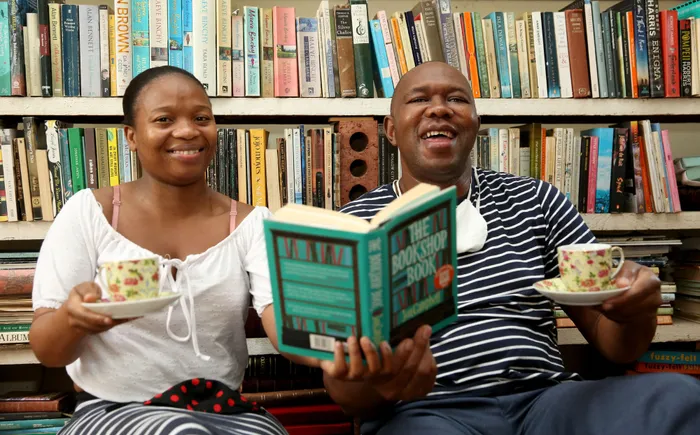Finding that happy place

South Africans are happiest when spending time with loved ones …. and sipping tea, according to a recent SA Rooibos Council survey. Enjoying laughter, fellowship, tea and a good book are Khanyisile Cele, left, and her partner, Richard Nzima. Both are Denis Hurley Centre Street Lit book vendors. Today is the International Day of Happiness, as well as World Storytelling Day, which celebrates the art of storytelling. Picture: Shelley Kjonstad/African News Agency (ANA)
Durban - Being with family and close friends, laughing out loud, enjoying a hot cup of tea and helping another person.
These are some of the "happy places" for South Africans as shown by a survey by the SA Rooibos Council (SARC) which has found the pandemic had shifted the South African psyche.
The council released the survey, carried out among nearly 700 people of different backgrounds and ages across the country, ahead of International Day of Happiness today. The key finding was that people were finding happiness in the simpler pleasures of life.
"The Covid-19 pandemic has had a profound impact on our lives. It has fundamentally changed the way we live, dress, work and interact with each other. It has forced us to hit the re-set button and question what makes us truly happy," said the report.
The top past-times in the pursuit of happiness were:
- Visiting close friends and family (65%)
- Sipping a soothing cup of tea (56%)
- Being in nature (53%)
- Lending a helping hand to someone in need (39%)
- A good night's rest and laughing out loud (tied at 29%)
- Exercise (23%)
- Reading a good book (22%)
- Spending time with a furry friend (20%)
- Indulging in a sweet treat (18%)
SARC spokesperson Adele du Toit said that based on the survey's results, it was evident that the disruption caused by the pandemic and subsequent lockdown had changed how people talk about and conceptualise happiness.
"In many ways, the pandemic has forced us to take a step back and reconsider the value we place on the simpler, more meaningful things in life," said Du Toit, adding that the majority of respondents (96%) agreed that happiness had become more about well-being than pleasure seeking.
Nine out of ten respondents said they could do with more comfort in 2021, with many admitting that last year was tough on them mentally.
"In times of crisis, we turn to comfort and want to spend our time and energy on doing things which leave us feeling content and happy," said du Toit.
The South African Depression and Anxiety Group (Sadag) confirmed yesterday that call volumes had more than doubled during lockdown.
Sadag's Cassey Chambers said: "Before lockdown, we were receiving about 600 calls a day. Since the lockdown, our call volumes have literally doubled to more than 1200 calls a day. We are now dealing with over 1400 calls a day and that excludes additional emails, SMS and WhatsApp messages and social media.
"In our new normal, our world is filled with a lot of negative, scary things that can cause anxiety and depression. We need to ensure we look after our mental health by doing things that help protect our mental wellness through self tips, relaxation techniques, doing things you enjoy and connecting with friends and family," she said.
Describing 2021 as starting off as "pretty rocky" for many, with increased levels of anxiety and depression because of the second Covid wave, Chambers said people should focus on what they can control.
"Focus on how to manage your stressors. We can't control or change Covid-19 and the impact it has had on our lives. But we can control how we react and respond, as well as by putting our mental health at the top of our priority list to ensure resilience and coping skills," said Chamber.
Yesterday also saw the release of the World Happiness Report which covered the lockdown year.
Finland maintained its top place as the country with the happiest citizens, followed by Iceland, Denmark and Switzerland. South Africa, at 76, was way down the list, while Zimbabwe sat in the last place (95) as having the least happy citizens.
The principal source of data for the annual World Happiness Report is the Gallup World Poll, with interviews conducted through telephone interviews and for the first time, no face-to-face interviews because of the pandemic. The 2020 round of surveys was about two thirds as large as usual.
"Trust and the ability to count on others are major supports to life evaluations, especially in the face of crises. To feel that your lost wallet would be returned if found by a police officer, by a neighbour or stranger is estimated to be more important for happiness than income, unemployment and major health risks," said the report.
It also highlighted that mental health had been profoundly affected during the pandemic and lockdown.
"One major element of Covid-19 has been physical distancing or self-isolation, posing a significant challenge for people's social connections, vital for their happiness.
"People whose feeling of connectedness fell had decreased happiness, as did people whose sense of loneliness increased and whose social support was reduced.
"Many positive features of a person’s life helped to protect their sense of connectedness; these included gratitude, grit, prior connections, volunteering, taking exercise and having a pet," said the report.
It also added that those who had lost jobs or who had been “furloughed” had experienced a significant decline in life satisfaction relative to those who continued working,
"Countries that have introduced more substantial labour market protections for workers have generally seen less severe declines in well-being," stated the report.
The Independent on Saturday